Presidency College, Chennai
Presidency College is an arts, commerce and science college in the city of Chennai in Tamil Nadu, India. Established as the Madras Preparatory School on 16 October 1840 and later, upgraded to a high school and then, graduate college, the Presidency College is one of the oldest government arts colleges in India. It is one of the two Presidency colleges established by the British in India, the other being the Presidency College, Kolkata.
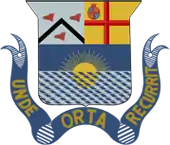 | |
Former name | Madras Preparatory School, Madras High School |
|---|---|
| Type | Government College |
| Established | 1840 |
| Students | 3894 |
| Undergraduates | 3105 |
| Postgraduates | 789 |
| Location | |
| Campus | Urban |
| Nickname | Presidencians |
| Affiliations | University of Madras |
| Website | presidencycollegechennai |
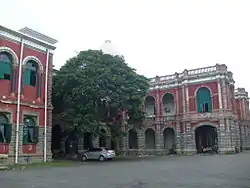
History
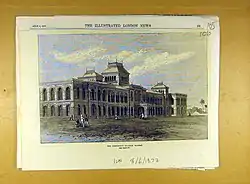
At the behest of Sir Thomas Munro, a Committee of Public Instruction was formed in 1826. In 1836, the duties of the committee were taken over by a "Committee of Native Education". The plans drawn up by the committee did not commend themselves to the Governor of Madras, Lord Elphinstone, who in turn proposed nineteen resolutions, which were passed unanimously.[1]
As first principal, the choice of Elphinstone fell on E. B. Powell, a University of Cambridge Wrangler in mathematics, who accepted the post. Powell reached Mumbai (Bombay) on 20 September 1840 but did not arrive at Chennai (Madras) until 24 November, the journey from Bombay to Madras taking some four weeks. In the meantime, the committee had invited a Mr Cooper, from the Hoogly College, Kolkata (Calcutta), to carry out the duties of principal temporarily, at a salary of Rs. 400 a month. Cooper accepted the invitation and came to Chennai (Madras). He and his staff opened Presidency School, a preparatory school, in a rented building in Egmore known as Edinburgh Home on 16 October 1840. Cooper remained in the preparatory school for only a few months. Soon after Eyre Burton Powell's arrival and before the opening of the high school department on 12 April 1841, he returned to Kolkata (Calcutta). The preparatory school was shifted to Popham's Broadway in 1841.[1]
The schools grew into Presidency College. When the University of Madras was founded in 1857, Presidency College was affiliated to it.[1]
In 1870, the college moved to its present location in Kamaraj Salai, opposite Marina Beach.[2]
Courses
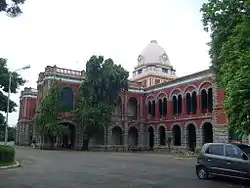
Arts
- Tamil Literature [Tamil]
- History [English and Tamil]
- Political Science [English and Tamil]
- Economics [English and Tamil]
- Economics [English and Tamil] (with vocational subject)
- English Literature [English]
- Telugu Literature [Telugu]
- Hindi Literature [Hindi]
- Malayalam Literature [Malayalam]
- Urdu Literature [Urdu]
Sciences
- Mathematics [English and Tamil]
Commerce
- Corporate Secretaryship [English]
Arts and social science
- History
- Political Science
- Public Administration
- Economics
- Tamil
- Telugu
- English
- Sanskrit
- Social work (MSW)
Sciences
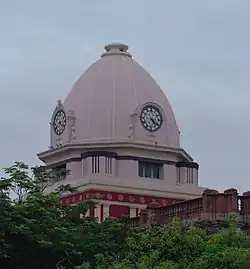
- Computer Science (MCA),
- Mathematics
- Statistics
- Physics
- Chemistry
- Botany
- Zoology
- Geology
- Geography
- Applied Microbiology
- Psychology
M.Phil. courses
- English
- History
- Political Science
- Public Administration
- Economics
- Tamil
- Telugu
- Sanskrit
- Mathematics
- Chemistry
- Botany
- Zoology
- Computer Science
- Geography
- Commerce
Doctorate courses
Facilities for research leading to the Ph.D. degree are available in the
- Mathematics,
- Computer Science,
- Statistics,
- Physics,
- Chemistry,
- Botany,
- Zoology,
- Geology,
- Geography,
- History,
- Political Science,
- Public Administration,
- Economics,
- Commerce,
- English,
- Tamil,
- Sanskrit and
- Telugu
departments.
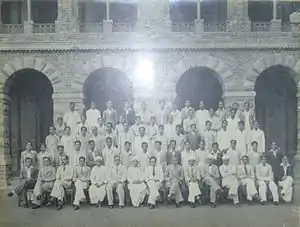
Rankings
| College rankings | |
|---|---|
| General – India | |
| NIRF (Colleges) (2020)[3] | 5 |
Presidency College, Chennai is ranked fifth among colleges in India by the National Institutional Ranking Framework (NIRF) in 2020.
Notable alumni
- Alagappa Alagappan (1925-2014), Indian-born American founder of the Hindu Temple Society of North America[4]
- Vallal Dr.RM.Alagappa Chettiar, (1909-1957), Industrialist and Philanthropist.
- E. S. Appasamy (1878-1963), educator, social worker in Chennai
- K. Seshadri Iyer - Dewan of Mysore
- Sir T. R. A. Thumboo Chetty First Indian Chief Judge of the Chief Court of Mysore, Offg. Dewan of Mysore
- Subrahmanyan Chandrasekhar - Nobel laureate in Physics
- Bharat Ratna C. V. Raman, Nobel laureate in Physics
- Bharat Ratna C. Rajagopalachari, the last Governor-General of India
- Bharat Ratna C. Subramaniam - Minister, Finance Government of India
- G.P.Pillai[5] - Freedom Fighter, Close aide to Gandhiji during South African Indian issue
- T.M.Nair, One of the founders of Justice Party
- K. M. Cariappa, first Commander-in-Chief of Defence Forces of independent India
- Benegal Rama Rau, Governor, Reserve Bank of India
- S. Jagannathan, Governor, Reserve Bank of India
- K. V. K. Sundaram, Chief Election Commissioner of India (1958–1967)
- P. Chidambaram, Former Finance Minister of India
- M. P. Periasamy Thooran
- V Gopalsamy (Vaiko), Former MP, Founder of MDMK
- N. Ram, Managing Director and Editor in Chief, The Hindu
- G. N. Balasubramaniam, Carnatic vocalist
- V. S. Chandralekha, Politician and former IAS officer
- Paravastu Chinnayya Soori, Telugu scholar
- Sarvepalli Gopal, Chairman, National Book Trust and historian
- Nataraja Guru[6]
- C. P. Ramaswamy Iyer, Dewan of Travancore
- P. S. Sivaswami Iyer, Law Member of the Viceroy's Executive Council
- V. K. Krishna Menon (1896–1974), Defence Minister of India (1957–1962)
- C. R. Pattabhiraman, Minister, Law and Company Affairs, GOI
- Palani G. Periyasamy, businessman
- Ganapathi Thanikaimoni (1938–1986), Palynologist, Fyson Prize recipient, Research Director of Palynology Laboratory of the French Institute of Pondicherry
- Uma Sambanthan - social activist and wife of V. T. Sambanthan, one of the founding fathers of modern-day Malaysia
- K. K. Srinivasan, officer and founder of a pre-school for hearing-impaired children
- R. S. Subbalakshmi, educator and social reformer. (She was also the first Hindu woman graduate in the Madras Presidency)
- P. Subbarayan, Chief Minister of Madras
- K. Subrahmanyam, Secretary, Defence Production, Government of India
- Srinivasa Varadhan, Abel Prize laureate in Mathematics
- R. K. Krishna Kumar, Former director of Tata Sons and Padma Shri awardee
- T. R. Seshadari, Chemist and Padma Bhushan award
- O. V. Vijayan, Indian author and cartoonist, who was an important figure in modern Malayalam language literature
- Toppur Seethapathy Sadasivan, Plant pathologist and Padma Bhushan awardee
- C. V. Subramanian, Mycologist, Shanti Swarup Bhatnagar Prize recipient
- Pothan Joseph, Journalist
- Janaki Ammal, Indian Botanist and Padma Shri awardee
- Thavamani Jegajothivel Pandian, Geneticist and Shanti Swarup Bhatnagar Prize recipient
- T. R. Govindachari, Natural product chemist, Shanti Swarup Bhatnagar laureate
- Dr Gopal Subramanian - Founder of Indo American Society of Nuclear Medicine
- K. S. Hegde ,Supreme court Judge and Speaker of the Lok Sabha
- M K Stalin , Leader of DMK
- M M Ismail , Former chief justice madras high court
- Joseph Pulikunnel -renowned Christian social reformer and critic who advocated liberalism in church
- K R Ramanathan, Indian physicist and meteorologist. He was the first Director of Physical Research Laboratory, Ahmedabad
- Vazhakkulangarayil Khalid -Justice of the Supreme Court of India and acting Governor of the State of Jammu and Kashmir
- M.B Sreenivasan - Music director
- Edatata Narayanan, journalist and freedom fighter
- K.G Subramanyan, was an Indian artist. He was awarded the Padma Vibhushan
- Psycho Muhammad, is the first psychologist in Malayalam and a leading psychiatrist and author
- Govindarajan Padmanaban, Indian biochemist and biotechnologist. He was the former director of the Indian Institute of Science,
- Kasu Brahmananda Reddy, Former Chief minister Andhra Pradesh
- P.V Rajamannar, Chief Justice Madras High Court
- A. L. Abdul Majeed, he was a Sri Lankan politician and Member of Parliament
- Nilakanta Mahadeva Ayyar, he was a member of the erstwhile Indian Civil Service.
- C. V. Runganada Sastri, he was an Indian interpreter, civil servant and polyglot
- Sarah Chakko,first woman to be elected to the presidency of the World Council of Churches.
- M. K. Chandrashekaran, he was an Indian zoologist, regarded as the founder of Indian chronobiology,
- P. Coomaraswamy, he was a Ceylon Tamil lawyer and member of the Legislative Council of Ceylon.
- V. L. Ethiraj, he was an Indian lawyer and philanthropist who founded Ethiraj College for Women
- Salim Ghouse,is an Indian film, television and theatre actor, theatre director, and martial artist
- T. R. Govindachari, he was an Indian natural product chemist, academic, institution builder and the principal of Presidency College,
- S. Srinivasa Iyengar, he was an Indian lawyer, freedom-fighter and politician from the Indian National Congress. Iyengar was the Advocate-General of Madras Presidency
- L. V. Ramaswami Iyer, he was an Indian linguist who specialized in Dravidian languages
- K. Rajah Iyer, he was an Indian lawyer of the Madras High Court who served as Advocate-General of Madras Presidency
- Sarukkai Jagannathan, he was the tenth Governor of the Reserve Bank of India
- Kadambur R. Janarthanan, he was a union minister of India and a leader of All India Anna Dravida Munnetra Kazhagam (AIADMK)
- K. S. Venkataramani, he was an Indian lawyer and an acclaimed writer in English
- V. Kanakasabhai, he was an Indian lawyer, historian and Dravidologist of Sri Lankan Tamil descent
- Sonti Kamesam, he was an Indian timber engineer and scientist
- Kanmani,is an Indian film director who has worked on Tamil and Telugu and language films.
- Pattathuvila Karunakaran,he was an Indian film producer and short story writer of Malayalam literature.
- Gopalan Kasturi, he was an Indian journalist who served as the Editor of The Hindu from 1965 to 1991
- M. O. P Iyengar, prominent Indian botanist and phycologist
- Dr. V. Shanta, she was an Indian oncologist and Magasaysay Award, Padma Shri, Padma Bhushan,Padma Vibhushan Awardee
Notable faculty
- E. B. Powell
- Sarvepalli Radhakrishnan
- John Mathai
- Alfred Gibbs Mourne
- Philip Furley Fyson
- Mark Hunter (Civil Servant )
- E. W. Middlemast
- Gustav Solomon Oppert
- Harold Papworth
- Peter Percival
- A. Chakravarthi
- Paravastu Chinnayasuri
- T. R. Govindachari
- P. C. Kokila
- T. P. Meenakshisundaram
- Muhammed Metha
- Chirayinkeezhu Ramakrishnan Nair
- M. Nannan
- Samuel Satthianadhan
- B. G. L. Swami
- Atoor Ravi varma
- Perumal Murugan
- M. O. P Iyengar
References
- "The History of Presidency College". archives.chennaionline.com. Archived from the original on 13 November 2009. Retrieved 29 September 2017.
- http://www.hindu.com/2007/03/05/stories/2007030515050200.htm
- "National Institutional Ranking Framework 2020 (Colleges)". National Institutional Ranking Framework. Ministry of Education. 11 June 2020.
- "Alagappa Alagappan, 88, Dies; Founded Hindu Temples Across U.S." Retrieved 8 July 2018.
- "Setting an old record straight". The Hindu. Retrieved 25 September 2017.
- Thadathil, George (2002). "The Making of a Tradition: The Vision of Nataraja Guru" (PDF). Divyadaan. 13 (2): 159–190. Archived from the original (PDF) on 23 March 2014.